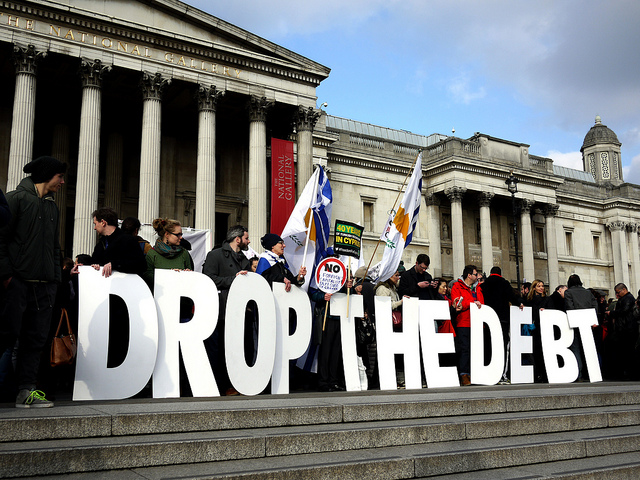Although growth-critique is currently in vogue and degrowth is mentioned favorably even by the pope in his most recent encyclical, there is as yet almost no scientific research on degrowth as a social movement.
We can now present the first empirical findings on the character of this movement, based on a survey we did at the 2014 Degrowth-Conference in Leipzig, in which 814 conference participants took part, and a cluster analysis of their responses.
The main argument in our longer essay in German language is that degrowth is an emerging but heterogeneous social movement representing in its essence a critique of capitalism and social domination that makes self-transformation and current collective practices the starting point for a broad societal transformation. Our conclusions can be summarized in four propositions:
Whether degrowth should be considered a social movement or merely a platform for the discussion of alternatives is controversially debated, as is the emancipatory substance and transformative potential of growth critique. Moreover, degrowth is often criticized as merely reflecting the post-materialist discomfort of the wealthy, educated and privileged who needn’t worry about issues of justice and distribution. Therefore, it is portrayed as a superficial and primarily cultural argument that avoids a critique of capitalism and, accordingly, confrontational political positions and practices.
In contrast to this, Ulrich Schachtschneider has recently shown in an analysis of the Leipzig conference program that at least the community gathered there does seem to be united in emancipatory approaches and a critical view of capitalism. Several other authors have attempted to further categorize the heterogeneity of growth-critical actors in order to specify the rightful addressees of such criticism.
However, these remain fixated on the typical positions in the post-growth discourse as published in books and articles. But can these same differences also be found among the people who are active in the field of degrowth at the grassroots level? What are the decisive lines of conflict in this field, and which groups support the respective positions?
The vast majority of people gathering under the label of "degrowth" stand for a transformational perspective that is critical of social domination and, in large parts, also of capitalism. Although there was substantial disagreement among the conference participants in many regards, they were overwhelmingly united by a shared basic consent that can roughly be summarized as follows:
Growth without environmental destruction is an illusion. Therefore, economic shrinkage in the industrialized countries will be inevitable. This includes that we will have to abstain from certain amenities we have got used to. The necessary transformation towards a post-growth society needs to be peaceful and emerge from below; it amounts to overcoming capitalism, and female emancipation needs to be a central issue in the process.
This consensus derives from those questions on which less than 100 people opposed the majority opinion. However different people's motives for rejecting or agreeing to these statements might be, the results show a great deal of consensus on central points of shared concern. The common ground of these consensual views is, in essence, a critical view of social domination. Although remaining largely unspecified for the time being, this shows that allegations of lacking critique of domination and capitalism occasionally brought forward by left-wing protagonists miss the self-conception of those who identify with the goals of the degrowth debate.
Our findings clearly demonstrate that the degrowth movement is internally heterogeneous and comprises of several different currents, whose orientation and approaches often don't match the widespread perception of degrowth. We identify five currents that differ not only in terms of substantive attitudes, but also in terms of political and day-to-day practices.
Degrowth stands for a critique of capitalism and domination that makes the current individual and collective practice the starting point for a broad societal transformation. To our minds, the existence of this last, fifth current is decisive for what is qualitatively new about the degrowth movement. Firstly, it is, both socially and in terms of ideas, an important catalyst for the perceptibility of one degrowth movement as an alliance of its different currents. Secondly – as indicated by the large share of non-German respondents in this current – it is here that an understanding of transformation originally linked to the idea of décroissance seems to play the largest role: an approach that has only recently spread from Southern Europe to German speaking countries.
For one thing, this is evidenced by the fact that the fifth current very clearly rejects the idea that climate change is a larger future threat than social injustice, while equally broadly sharing the view that an economic contraction will be inevitable in the industrialized countries. And for another, it paradigmatically stands for the specific mode of articulating critique and practice that has become the hallmark of what "degrowth" stands for at large, far beyond this particular current.
At the heart of the project is the quest for transformative practices that depart from people's day-to-day life, aiming to change not only the structure of social relations but also of the self that is inseparable from them. These forms of action and organizing are not only about opening real spaces for acting "differently", but also about the actors themselves "becoming something different" along the way, about becoming different subjects that are not produced by growth-fixated practices. This corresponds with an anarchist-inspired understanding of revolution: "Revolution" is no future historic break, but that very process of current self- and world-transformation once it becomes epidemic. According to this idea, just and liberated forms of practice and subjectivity are 'contagious' and bound to gradually unfold an ever broader impact.
Contrary to oft-heard allegations, this does not amount to renouncing a further-reaching transformative vision. If anything, it is rather a radicalization, insofar as it involves problematizing one's own way of existing as a subject, i.e. making one's own mode of existence the object of a necessary revolution. Instead of blaming everything on real or imagined "opponents" or anonymous "structures", it opposes one's own entanglement within a resource-intensive mode of living that, on a global level, is incompatible with enabling a good life for everyone. This is based on the realization that one's own practices of consumption, mobility and patterns of work and life are part of what needs to be practically challenged.
In light of this we might have to reassess the oft-criticized fact (indeed confirmed by our findings) that degrowth activists mainly recruit themselves from privileged, academically educated social strata: If the movement's core concern is with global injustice, why should it be a problem that precisely some of those profiting most from these injustices begin to question their own mode of living and their embodied "mental infrastructures"? For such critical practice to unfold a broader impact, it is exactly the critical reflection of these privileges that's needed; and a deep understanding that the same issues are experienced and perceived differently from other social positions. However, as we can see from the more individualistic forms of questioning lifestyles and the personalized ascriptions of guilt – prevalent particularly in current 1 and 3 – this is indeed not yet part of the shared consensus. What direction the movement's development will take in the future, and how it will deal with its inner tensions, is up to its coming discussion processes and its practical learning from concrete experience. ------------------ Translation: Christiane Kliemann

Against the background of a looming ecological collapse and extreme socio-economic inequality, growth-critical scholars and activists debate various eco-social policies that can facilitate transitions towards genuinely environmentally sustainable and socially equitable societies. Such policies include work sharing, time-banks, job guarantees, complementary currencies and minimum income schemes....

By Panos Petridis and Angelos Varvarousis “I’m a pessimist because of intelligence, but an optimist because of will” (A. Gramsci) We might err, but we believe that in the night of the elections in January 2015 a symbolic “tipping point” has been reached in Greece, signifying a break with a one way pre-dictated future, and adding vital fresh wind by pointing to the possibility of multiple al...
We are pleased to announce that registration to the conference is now open and the basic conference programme is available on our website: As of now, it includes seven keynote speeches and more than 20 panel discussions in addition to chosen scientific and artistic sessions. In the course of the coming weeks we will be completing the programme by around 250 further workshops and scientific sess...